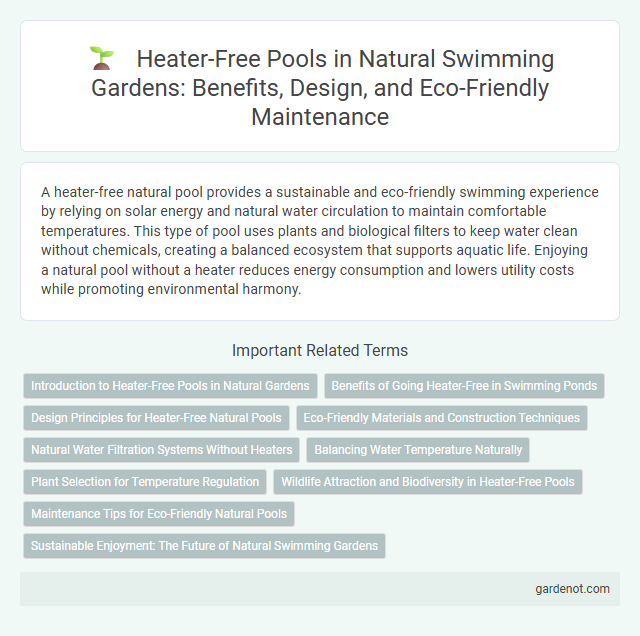A heater-free natural pool provides a sustainable and eco-friendly swimming experience by relying on solar energy and natural water circulation to maintain comfortable temperatures. This type of pool uses plants and biological filters to keep water clean without chemicals, creating a balanced ecosystem that supports aquatic life. Enjoying a natural pool without a heater reduces energy consumption and lowers utility costs while promoting environmental harmony.
Introduction to Heater-Free Pools in Natural Gardens
Heater-free pools in natural gardens utilize solar gain and geothermal heat to maintain comfortable water temperatures without relying on electric or gas heaters. These pools are designed with sedimentation zones and biofilters that support aquatic plants, enhancing water clarity and thermal regulation naturally. By integrating eco-friendly materials and passive solar heating, heater-free pools offer sustainable swimming solutions aligned with the principles of natural pool design.
Benefits of Going Heater-Free in Swimming Ponds
Heater-free swimming ponds reduce energy consumption and lower operating costs, promoting eco-friendly living. Natural temperature regulation enhances swimmer comfort by relying on solar heating and thermal mass. Eliminating heaters supports aquatic ecosystems by maintaining stable water quality and encouraging biodiversity.
Design Principles for Heater-Free Natural Pools
Heater-free natural pools rely on design principles that maximize solar gain and optimize water circulation to maintain comfortable temperatures without external heating. Incorporating shallow regeneration zones with aquatic plants enhances thermal regulation by storing and slowly releasing heat, while strategic orientation and exposure to sunlight increase passive warming. Efficient biological filtration and a carefully balanced ecosystem reduce reliance on mechanical systems, promoting sustainable energy use in natural pool design.
Eco-Friendly Materials and Construction Techniques
Heater-free natural pools rely on eco-friendly materials such as reclaimed wood, natural stone, and non-toxic sealants that enhance thermal insulation while minimizing environmental impact. Construction techniques prioritize passive solar design, utilizing strategic pond orientation and natural shading to maintain optimal water temperature without external heating. This sustainable approach reduces energy consumption and supports biodiversity by creating a balanced aquatic ecosystem.
Natural Water Filtration Systems Without Heaters
Natural water filtration systems maintain optimal pool conditions by utilizing biological processes and plant-based filtration without the need for heaters. Constructed wetlands, gravel filters, and aquatic plants work synergistically to purify the water, promoting a balanced ecosystem that controls algae and harmful bacteria naturally. This eco-friendly approach reduces energy consumption and preserves water quality, extending the swimming season in heater-free natural pools.
Balancing Water Temperature Naturally
Heater-free natural pools maintain optimal water temperature through a combination of solar radiation absorption and strategic plant placement that provides shade and insulation. The ecosystem's balance, including microbial activity and water circulation, regulates thermal fluctuations without mechanical heating. This sustainable approach ensures consistent warmth while minimizing energy consumption and environmental impact.
Plant Selection for Temperature Regulation
Choosing native aquatic plants like water lilies, pickerelweed, and hornwort enhances temperature regulation in heater-free natural pools by providing shade and reducing water temperature fluctuations. These plants improve water circulation and oxygenate the pool, contributing to a stable thermal environment. Strategic placement of submerged and floating vegetation can significantly moderate temperature, fostering a comfortable swimming experience without artificial heating.
Wildlife Attraction and Biodiversity in Heater-Free Pools
Heater-free natural pools create a thriving habitat that supports diverse wildlife, including amphibians, insects, and aquatic plants, which contribute to enhanced biodiversity. The absence of artificial heating systems maintains a natural temperature regime, fostering ecological balance and encouraging native species to flourish. This promotes a sustainable ecosystem that benefits both the pool environment and surrounding habitats.
Maintenance Tips for Eco-Friendly Natural Pools
Maintaining a heater-free natural pool requires regular removal of debris and monitoring water quality to support a balanced ecosystem without synthetic chemicals. Incorporating native aquatic plants aids in natural filtration, reducing algae growth and enhancing water clarity. Using a biological filter with beneficial bacteria promotes nutrient cycling, ensuring the pool remains clean and eco-friendly year-round.
Sustainable Enjoyment: The Future of Natural Swimming Gardens
Heater-free natural pools utilize advanced biological filtration systems and solar energy to maintain comfortable water temperatures year-round without relying on fossil fuels. Sustainable enjoyment is achieved through eco-friendly designs that promote biodiversity, reduce carbon footprints, and integrate seamlessly with the environment. This innovative approach to natural swimming gardens represents the future of energy-efficient, chemical-free aquatic spaces.
Heater-free pool Infographic

 gardenot.com
gardenot.com